Did you know that lemons float but limes sink?
Neither did we. But it’s true: Lemons float and limes sink!
After we discovered this we predicted which objects would float and which objects wouldn’t float. Then, we investigated.
In our investigation, we learnt that whether an object floats has nothing to do with its weight, but its density. For example, in our investigation, we found that an empty can of coke floats and a full can of diet coke floats despite being heavier. Furthermore, a tiny paper clip didn’t float.
Right at the end of our lesson, some of the children enquired further:
- “If you put something that sinks on top of something that floats what happens?” (Pippa)
- “Do boats have sides to stop the water getting in and making it heavier?” (Edward)
We hadn’t planned to but we investigated it anyway – science is fun and we should enquire and investigate as much as possible. Ask your child what we found out!
Ask your child why a lemon floats but a lime sinks. They should be able to give you a ‘text-book’ answer including the words ‘density’ and ‘particles’.
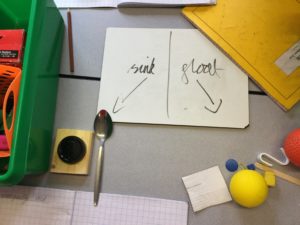
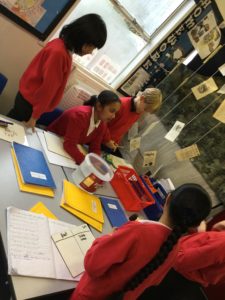
Robot coding!
This morning, as part of STEM week, we were lucky to have a visitor who taught us how to code robots. In groups we were given a car and a computer and by the end of the session each group had programmed their robot to move in a variety of ways.
It was really exciting and we learnt lots about computer coding, science, maths and working with others.
Ask your child if they can figure out what this robot would do.
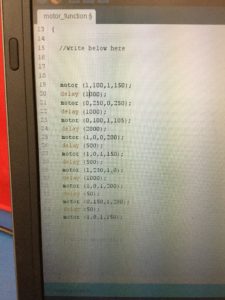 Hint: the number ‘1’ = forwards mode.
Hint: the number ‘1’ = forwards mode.
We learnt that coding can be quite frustrating – one tiny mistake in your script can mean that your robot does nothing. However, we did enjoy de-bugging (finding the errors) our scripts to ensure they worked.
Computing can be a scary topic for some adults (most of us aren’t part of the coding generation like Y5) but there are some great online resources that can help. A particular favourite of mine is Barefoot Computing. It’s free and links closely to the National Curriculum. Although it’s aimed at teachers, it will be beneficial for everyone because the website is also easy to navigate and understand.
Here’s some pics of us coding our robots…

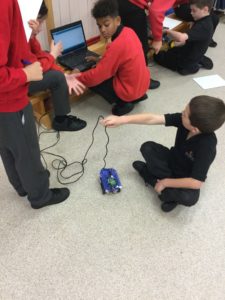




VE Day celebrations
We had a great time dressing up and celebrating our very own Victory in Europe day on Friday.
It was a fantastic way to end our ‘Class Novel’ topic and we all had a great time. As well as having lots of fun at our VE day party, we also reflected on all the great learning we’ve enjoyed over the last eight weeks. It was particularly useful to hear which aspects of the topic the children have enjoyed the most and why.
Ask your child what they learnt over the course of this big topic and discuss the relevance/importance of this learning.
Also, discuss their views on the class novel they read. Did they enjoy it? Why? Did they empathise with the characters? Why?
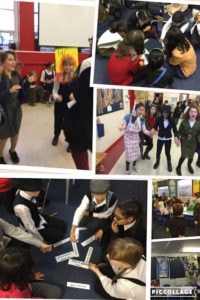
Guided Reading
Due to STEM week, guided reading this week will not be happening as usual. On Friday, all children were asked to have read to their target page by Tuesday. Please don’t worry if your child doesn’t quite manage to read to their target page – I appreciate that it may be difficult to manage on top of homework and general life (although most groups will have had their target page set on Monday and Tuesday last week giving them almost a week to read).
When changes to guided reading are made it is always to improve learning. Although your child may generally read on a set day (eg Tuesday) this will change from time to time. Please don’t allow your child to be anxious about not having read to their target page – this does not make reading enjoyable. Instead, encourage them to read to their target page soon after they are given it.
Thank you.
18 November 2016
This week’s homework is practice makes perfect and is due Thursday 24 November:
Complete Mr Lawton’s maths challenge sheet which is practising what we have learnt this past week in our maths lessons.
18 November 2016
Choose some words from previous spelling lists that you found hard and practise them using the strategies at the front of your homework book.
SEAL
This week, we did an activity that focused on some dilemmas. The children had to work as a team to decide whether they thought each situation was serious and which not as serious (although still a problem).
The children ordered each scenario from 1-9 and placed them into a Diamond 9. Number 1 being the most concerning and 9 being less of a concern. We had a discussion and each team presented their ideas.
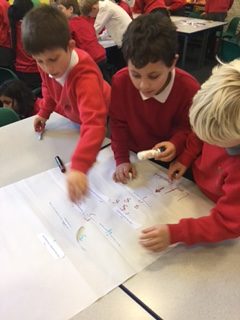
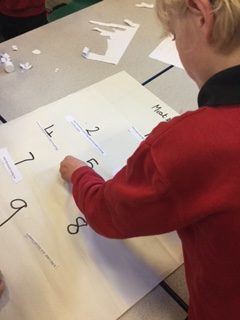
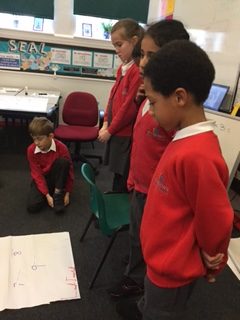
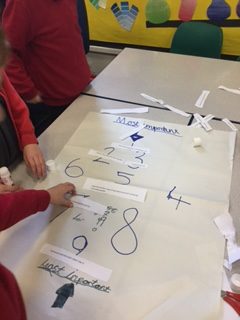
18 November 2016
We’re still focussing on irregular verbs this week so here’s another list. However, there are lots more. Try to spot some when you’re reading.
Children may be tested on the infinitive form of the verb (to lose) or the simple past tense version of the word (lost). The children have already spent some time looking at these words so they aren’t unfamiliar. However, as we’ve moved back to testing every week, we’ve dropped the number of spellings down to eight.
If you’ve any questions about this list or spelling generally, please ask.
to lose lost
to fall fell
to hide hid
to drive drove
to fight fought
to win won
to pay paid
to find found
18 November 2016
The homework this week is talk time and is due in on Thursday 24 November.
What children say about bullying
We’re reaching the end of anti-bullying week (although, of course, every week should be an anti-bullying week!).
At Moortown, there is very limited bullying – in fact, children frequently tell us there is none at all, which is great. Even so, it’s still important to prepare your child if they encounter bullying. Please discuss at home how harmful bullying can be, and encourage them to start telling other people.
A report by the NSPCC describes the nature of bullying experienced by young people contacting Childline. Its key findings are:
- Bullying is the second most common reason for boys and the third most common reason for girls to contact Childline. It makes up 9% of all counselling sessions (25,740 sessions in 2015/16).
- In a quarter of counselling sessions about bullying, children also talked about mental health and wellbeing issues.
- Last year, Childline provided more counselling sessions about physical bullying (4,723 sessions) than online bullying (4,541 sessions).
- However, there has been an 88% increase in counselling about online bullying over the past five years.
- In 2015/16, there were 1,420 counselling sessions with young people talking about bullying on social networking and gaming sites, up 34% on the previous year.
- Of the children who contacted Childline about bullying, 12% said they had not told anyone else about it.
- The young people who had told someone else were most likely to have told a parent (31%), a teacher (30%) or a friend (16%).
- Childline delivered over 300,000 in-depth counselling sessions to children and young people in 2015/16.
- Overall, Childline provides more counselling sessions to girls than to boys.
- Although Childline provide more counselling sessions about bullying to girls, it is a more common concern among the boys who do contact them.
- Due to the confidential nature of the Childline service, young people do not always disclose personal information, such as their age and gender.